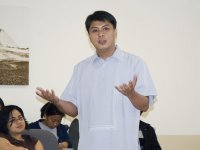
Executive Director of the Southeast Asian Press Alliance Roby Alampay discusses media laws and restrictions and new media's impact on Southeast Asia
By Amanda Natividad
AsiaMedia Staff Writer
Monday, June 12, 2006
Los Angeles --- Roby Alampay, executive director of the Southeast Asian Press Alliance (SEAPA), believes that the only obligation of the media is to be as neutral as possible. In an event last Tuesday at UCLA, he also discussed the importance of understanding individual countries' media policies before expecting media freedom.
"It is impossible to try to capture diverse models for media operations in Southeast Asia in one paragraph, one page, one sentence, one statement," Alampay said. The only fair statement that can be made about the media of the Southeast Asia region is that every journalist, everyone expressing a radical opinion is threatened in one way or another.
For example, he said, it is not widely known that it is illegal to for a group of five people in Singapore to gather without a permit. In August, 2005 four people outside an office building were ordered to disperse or face arrest for public nuisance for protesting the government expenditures public funds.
A key question that Alampay urged the audience to ask applies not just to Southeast Asia, but to every country: Who owns the press? Whoever owns the press controls it; the owner manipulates what is and what is not being reported.
While conglomerates and powerful political figures take ownership of many broadcasting systems, hope lies in cyberspace, he said. Internet news and blogs are increasingly popular and, though many governments aim to tighten their reins on this new media, citizens are finding more freedom to make their voices heard online.
"We know that the Internet is something inevitable, something needed for economies to be competitive in this day and age. Governments know this…everybody knows that it is inevitable that everybody must get on this highway one way or another," Alampay stated. In many areas, such as Singapore, the Internet is becoming a means of social gathering
Still, the Internet is not readily available in all parts of Southeast Asia. Alampay said that Internet access in Cambodia can cost as much as $2 per minute. He cited statistics from Internet World Stats which say that only 9 percent of the population of the Philippines is online. Burma's (Myanmar) online population is just a tenth of a percent. On the other hand, the Internet regularly reaches close to 70 percent of Japan, South Korea, Hong Kong and Singapore.
More influential in these areas are mobile phones, particularly SMS text messaging. 45 percent of Thailand's population, 65 percent of Malaysia and 43 percent of the Philippines own a mobile phone. Even Laos, a country in which the Internet is nearly nonexistent, has a 9 percent mobile phone user population, according to Telecompaper. From business executives to street beggars, mobile phones are indispensible to many in the region, said Alampay. New media is not limited to the Internet and as the World Wide Web goes mobile, these two technologies could form an incredible resource reaching millions of people.
SEAPA is a coalition comprised of five non-profit organizations was established in November 1998 in Bangkok. It is the only regional organization that exists solely to promote the freedom and protection of the press. SEAPA represents eleven countries.
Alampay began working with SEAPA in August 2004 after twelve years of working in journalism. His first job was reporting for the Philippine Daily Enquirer from 1991 to 1993; he then published and edited for Kampus Magazine from 1992 to 2000, and co-founded, designed, and managed FLIP Magazine from 2002 to 2003.
The significance and complexity of the Southeast Asia's media drives Alampay's work with SEAPA. Though he spent many years as a practicing journalist in the Philippines, he said that his staunch view on the promotion of media freedom is a bias that prevents him from calling himself a journalist today.
-----------------------------------------------------
Roby Alampay spoke at an event hosted by AsiaMedia with support from the UCLA International Institute. Alampay is also an occasional contributor to AsiaMedia.
Date Posted: 6/12/2006
Singapore

¿Wath is the new Internet?
ReplyDeleteEEPEL = Enviroment Standard of Software On Line
This web site is a personalizable, nimbled and practical system which runs software On Line, Web's pages, FTP's, and everything related to the Internet.
This environment offers system files, which are available for software that runs in EEPEL.
http://www.eepel.com.ar
what will all these talks and reports do ? there are so many parties talking about press independence for so many years but singapore press remains largely unchanged.
ReplyDelete